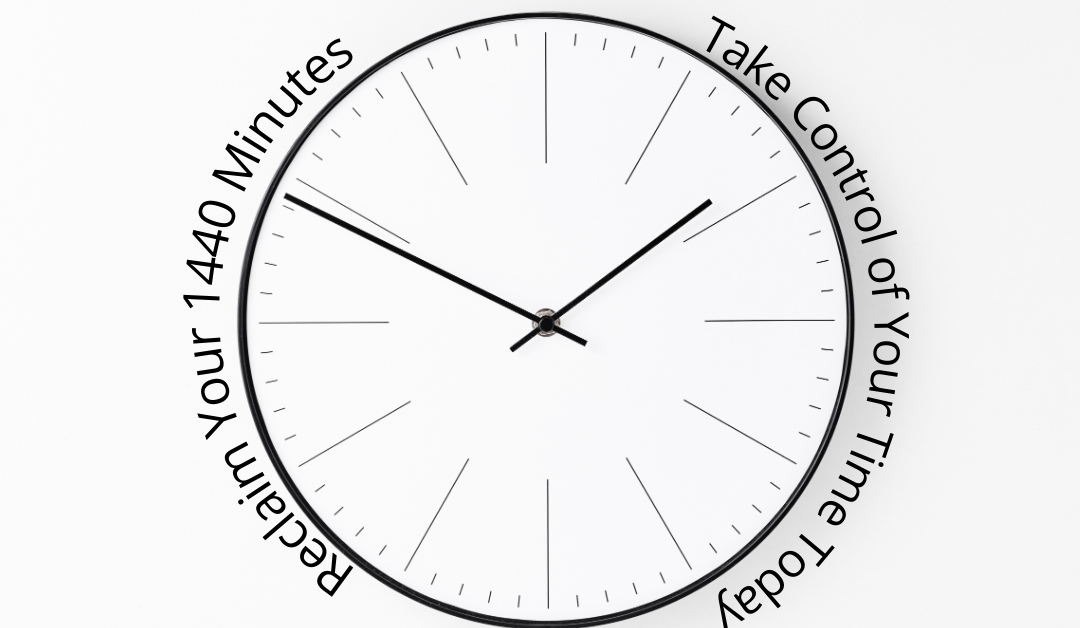Ever heard the saying, “Time is money”? Well, if that’s true, we’re all sitting on a goldmine every single day. Each morning, you’re handed a fresh batch of 1440 minutes—1,440 opportunities to reclaim your time and use it wisely. Sounds like a lot, right? But somehow, by the time the day ends, you’re often left wondering, “Where did all my time go?” That’s where reclaiming your time comes into play, helping you make every minute count.
That’s the thing about time—it doesn’t stop, slow down, or wait for anyone. So, if you’re not actively taking charge of it, chances are it’s slipping right through your fingers. The good news is, you can reclaim your time. Let’s dive into why those 1440 minutes matter and, more importantly, how to make every single one of them count.
The 1440-Minute Perspective
First things first: let’s break down the math. You get 24 hours in a day, or 1440 minutes. Now, some of that is already spoken for—sleep, meals, work, family time, and a bit of Netflix to unwind. But here’s where it gets interesting. Even if you sleep for 8 hours a night (a solid 480 minutes), that leaves you with 960 minutes to play with. Imagine having almost 1000 minutes at your disposal every day—pretty empowering, right?
But here’s the catch. We often let small, seemingly insignificant activities chip away at this treasure trove. Ten minutes scrolling social media here, fifteen minutes checking emails there, and before you know it, you’re down to the last few minutes and feeling like you’ve accomplished…well, not much. That’s why getting intentional with reclaiming your time is so important.
Why Time Management Is the Key to Success
Time management isn’t just about being organized or ticking off tasks on a to-do list. It’s about taking control of your life. When you manage your time well, you’re able to focus on what truly matters—whether that’s achieving your goals, spending quality time with loved ones, or just making space for some well-deserved downtime. Reclaiming your time is the first step to all these things.
Here are a few reasons why mastering time management is a game-changer:
- Increased productivity: When you know how to manage your time, you can get more done in less time. It’s about working smarter, not harder.
- Reduced stress: Ever noticed how stressful it feels to race against the clock? Effective time management allows you to meet deadlines without the last-minute panic.
- Better work-life balance: One of the biggest benefits is that you’ll have time to enjoy both work and play, instead of feeling constantly torn between the two.
How to Reclaim Your 1440 Minutes: Practical Steps
Ready to take back control of your day? Here are some simple, actionable steps to help you reclaim those precious minutes.
1. Audit Your Time
The first step toward reclaiming your time is understanding where it’s going. Spend a day or two tracking your activities, and you might be surprised by how much time is wasted on unproductive activities, like checking social media for “just a minute” (which often turns into 20).
Once you’ve logged your time, start auditing it by categorizing activities into four quadrants based on their enjoyment and productivity levels. Focus on eliminating tasks that are both unproductive and unenjoyable. This process will help you identify which activities are time-wasters and where you can reclaim time. A helpful resource for conducting time audits and gaining further insight into reclaiming your time can be found on HubSpot Blog.
2. Prioritize with Purpose
Not all tasks are created equal. Some move the needle toward your big goals, while others are just busy work. This is where prioritization comes in.
One of the most effective methods is the Eisenhower Matrix. It helps you decide what’s urgent, what’s important, and what can be delegated or even ditched altogether. Spend most of your time on tasks that are important but not urgent—they’ll have the biggest long-term impact.
3. Time Blocking: Your New Best Friend
Ever feel like your day is slipping away in a sea of distractions? Time blocking can fix that. It’s a simple technique where you schedule blocks of time for specific activities. For example, you might set aside 9 a.m. to 10 a.m. for deep work, 10 a.m. to 10:30 a.m. for checking emails, and so on.
By assigning each task its own time slot, you’re less likely to get distracted and more likely to stay on track. It’s a powerful way to make sure that you’re using your 1440 minutes as efficiently as possible, reclaiming your time for the activities that matter most.
4. The 80/20 Rule (Pareto Principle)
The Pareto Principle states that 80% of your results come from 20% of your efforts. In terms of time management, this means focusing on the small number of tasks that deliver the biggest results.
Look at your to-do list: Are there a couple of high-impact tasks you could focus on that would make a significant difference? These are your “80/20” tasks, and they deserve your attention first thing in the morning when your energy is at its peak.
5. Limit Multitasking
It’s tempting to think that doing multiple things at once will save time, but studies show the opposite. Multitasking leads to mistakes, lowers the quality of work, and actually takes more time in the long run.
Instead, practice single-tasking—focusing on one task at a time until it’s complete. You’ll do a better job and likely finish faster. Plus, the satisfaction of crossing things off your list one by one is incredibly motivating!
Protecting Your Time
Once you’ve taken steps to improve your time management, it’s important to safeguard that progress. Here’s how to protect those reclaimed minutes:
- Set boundaries: Be clear about when you’re available for interruptions and when you need uninterrupted focus time. It’s okay to say “no” sometimes!
- Batch similar tasks: Group similar activities together to save time. For example, check emails twice a day instead of 20 times, or run all your errands in one trip.
- Automate where possible: Look for tasks you can automate, like paying bills online or setting up auto-responders for routine emails.
- Unplug regularly: Distractions like social media can eat up minutes like candy. Take regular breaks from your devices to stay present and focused.
Your Time, Your Life
At the end of the day, reclaiming your 1440 minutes is about more than just productivity—it’s about living the life you want. Time is the one resource you can never get back, so it’s worth investing in managing it wisely.
By being intentional about how you spend your time, setting clear priorities, and using tools like time blocking and the 80/20 rule, you can take back control of your day and start moving toward your biggest goals. Remember, the clock is ticking—but you’re the one in charge of how you spend each and every one of those 1440 minutes.

